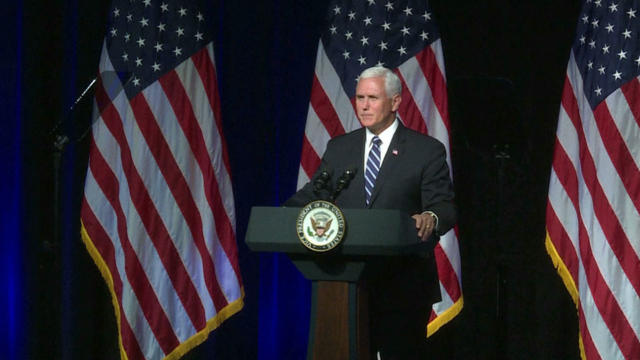A new Space Force will be in place come 2020 – as a sixth, separate branch of the U.S. military. The Trump Administration’s plan comes 35 years after President Ronald Reagan’s famous ‘Star Wars’ speech. And, it follows U.S. intelligence agency warnings that China and Russia are developing space weapons. CGTN’s Joshua Cartwright reports.
In 1983, U.S. President Ronald Reagan proposed an ambitious strategic defense initiative in space, which became known as “Star Wars.”
“I know this is a formidable technical task,” he said, “one that may not be accomplished before the end of this century.”
The deadline came and went, and the plan was never fully realized.
But on Thursday, U.S. Vice President Mike Pence made an announcement for a renewal of sorts – to meet what he said were emerging threats on a new battlefield.
“The time has come to establish the United States Space Force,” he said during a speech at the Pentagon.
It would be the country’s sixth military branch. Pence said the goal is to have the U.S. Space Force up and running by 2020. He cited increased space activity by rival countries as key to the decision, pointing the finger at two nations in particular.
“Both China and Russia have been conducting highly sophisticated on-orbit activities that could enable them to maneuver their satellites into close proximity of ours,” Pence cautioned, “posing unprecedented new dangers to our space systems.”
President Trump followed up Pence’s announcement with a tweet, writing “Space Force All the Way!”
Space Force all the way!
— Donald J. Trump (@realDonaldTrump) August 9, 2018
Trump first floated the idea of a Space Force back in March. But it’s been met with resistance by some in the Pentagon – including Trump’s own defense secretary, Jim Mattis, who said it would result in unwanted costs.
There’s also been outside criticism. In June, Russia warned of a “tough response,” saying that, if implemented, the Space Force would spark an arms race.
But, in the end, it may be the U.S. government that quashes the idea, as it requires congressional approval.
 CGTN America
CGTN America
 A new Space Force will be in place come 2020 as a sixth, separate branch of the U.S. military. The plan comes 35 years after President Ronald Reagan’s famous ‘Star Wars’ speech, and is being touted as a counter to the development of space weapons by China and Russia.
A new Space Force will be in place come 2020 as a sixth, separate branch of the U.S. military. The plan comes 35 years after President Ronald Reagan’s famous ‘Star Wars’ speech, and is being touted as a counter to the development of space weapons by China and Russia.
